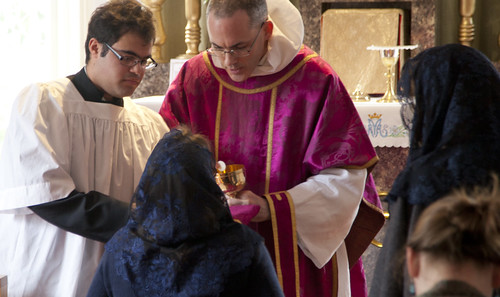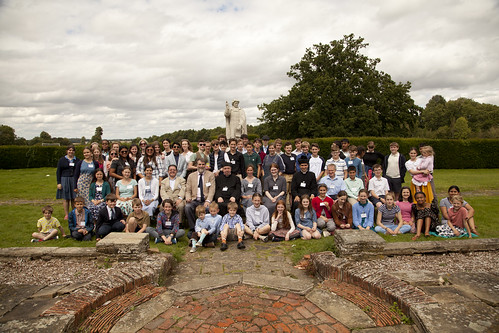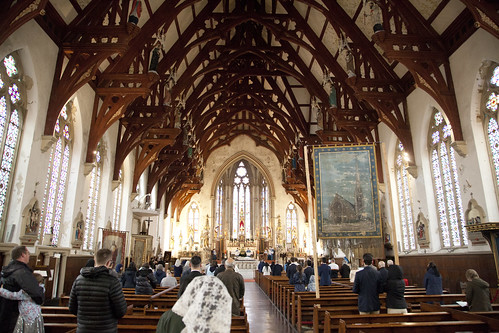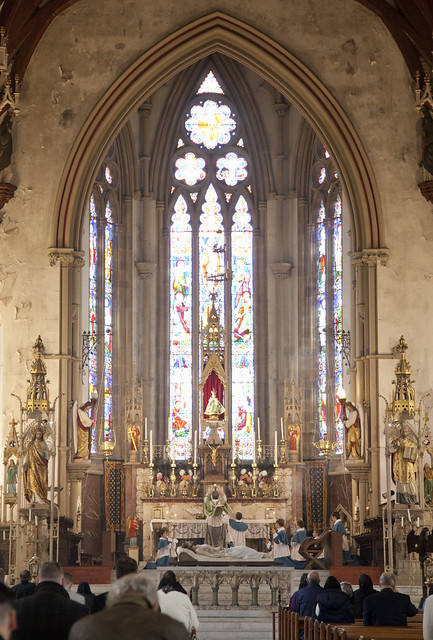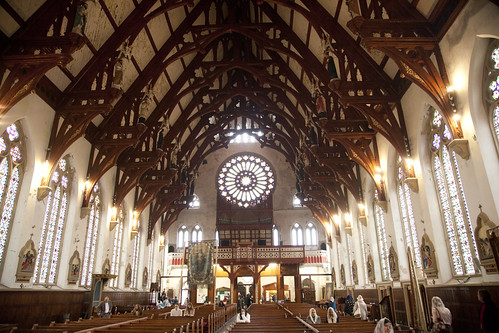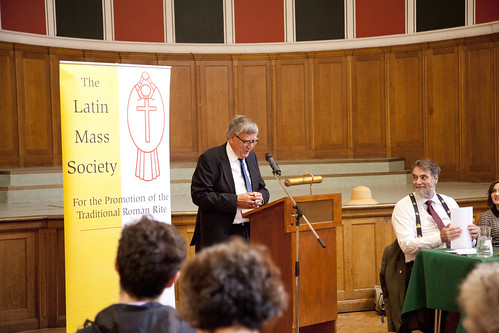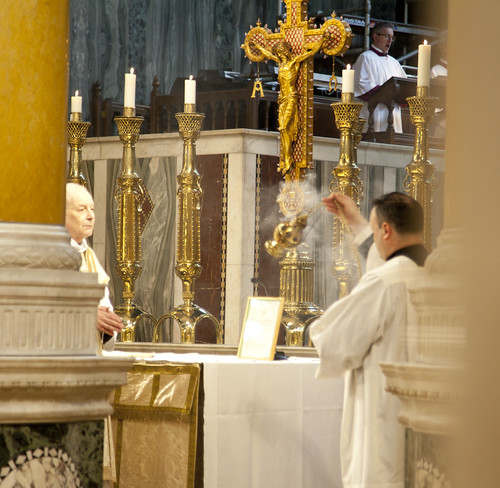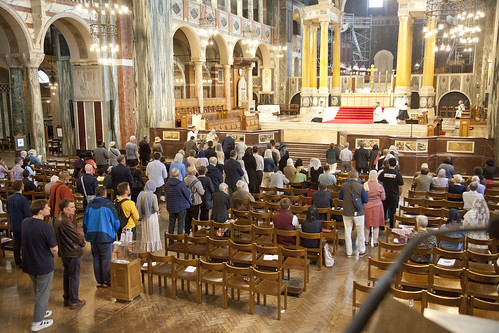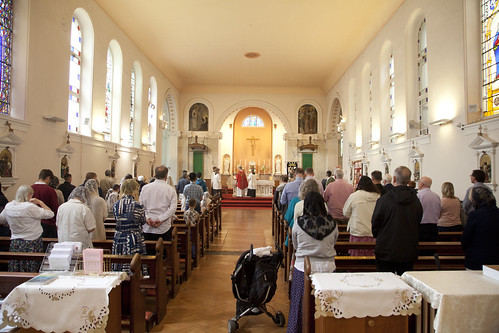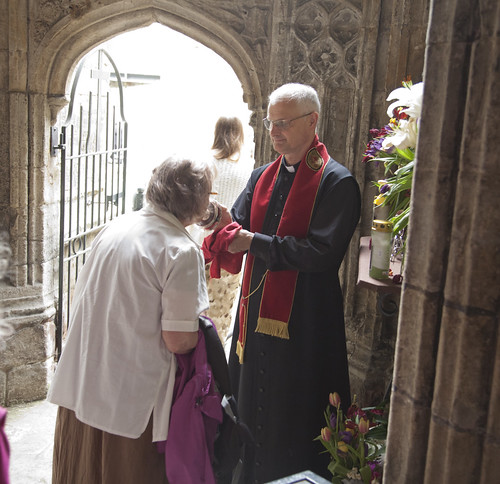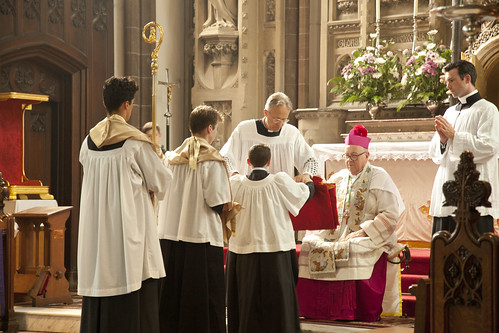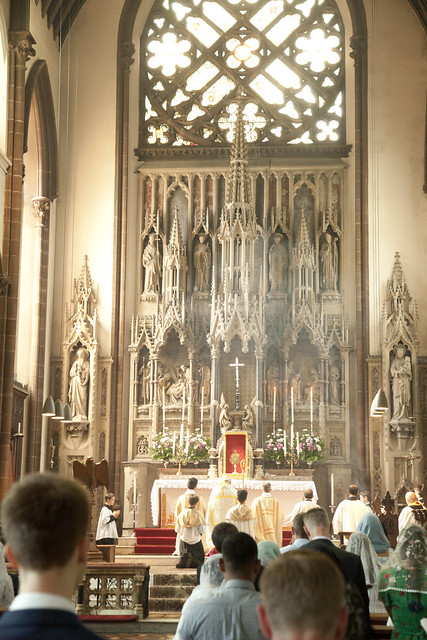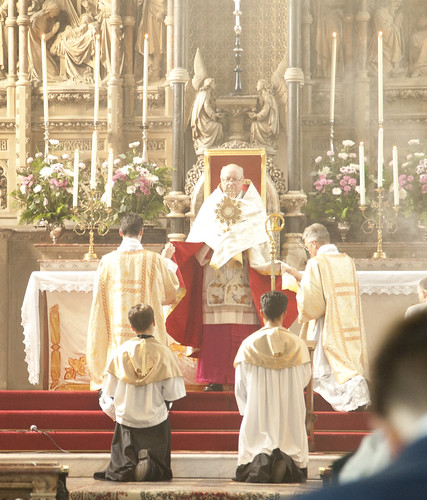Chairman's Blog
Iota Unum talks in London this autumn
They take place in the basement of Our Lady of the Assumption; please enter by the back entrance into the basement: 24 Golden Square, W1F 9JR near Piccadilly Tube Station (click for a map)
Doors open at 6:30pm; the talk will start at 7pm.
There will be a charge of £5 on the door to cover refreshments and other expenses.
20th October (Fri), Fr Thomas Crean OP: Can a Christian be a restorationist?
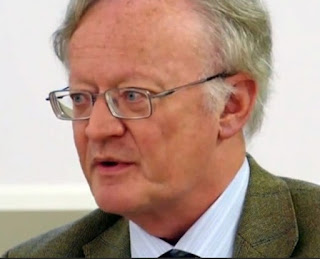 |
| Henry Sire |
Support the Latin Mass Society
On liturgical abuses: for Catholic Answers
 |
| Fr Alan Robinson of Corpus Christi Maiden Lane. Note what he's doing with his fingers: he has to hold forfinger and thumb together from the Consecration to the washing of his fingers after Communion. |
St Catherine's Trust Summer School 2023
St Walburge's, Preston, with the ICKSP
The flaking paint does not diminish the splendour of this church, and the confidence of successive Bishops of Lancaster in the Institute to revive it: it so happens that the current bishop, Patrick Swarbrick, was once a parish priest at St Walburge's and in that capacity invited Canon William Hudson ICKSP to celebrate Mass there twenty years ago. It was only some time after that initial contact that the Institute was given the church, in 2014, by Bishop Patrick Campbell.
Although both the holiday season and during a torrential downpour (don't the two go together?) there was a good-sized congregation. The scale of the church is clearly not going to be inappropriate to the size of the apostolate in the longer term.
LMS AGM 2023: photos
Missa Cantata was celebrated for us by Fr John Scott and accompanied by men of the Cathedral Choir, with chant and polyphony.
'Sacred and Great': booklet introducing the TLM by Joseph Shaw
I'm delighted to announce the launch of a revised edition of my booklet introducing the Traditional Latin Mass. Non-polemical and informative, this is a booklet you can safely give to your non-traditional friends, priests and bishops, or have on sale in churches and bookstalls.
11-15 copies - 15% off
16-20 copies - 20% off
21-25 copies - 25% off
26+ copies - 30% off
Also available from Amazon.com Amazon.co.uk and so on, but without bulk discount option.
Pilgrimage to Holywell: photos
This pilgrimage is in honour of the 7th century Welsh noblewoman St Winefride, Virgin and Martyr: also, the founder of a religious community. Unusually, she founded this community after her martyrdom, since she was brought back to life by her uncle St Beuno. That is the legend, and as so often this is reflected in the liturgical texts, and even the classification of her feast.
Support the Latin Mass Society
Interview in The European Conservative
Dr. Shaw, at the beginning of this year, Os Justi Press published your latest book The Liturgy, the Family, and the Crisis of Modernity, which I read with considerable enjoyment. I wanted to speak with you today on some further questions arising from your discussion in that book of the family and its place in the modern world. Based on your experience, can you say something about how large, traditional Catholic families, which have become something of a stereotype, differ from the current socially dominant type?
Having a large family tends to push one into a more old-fashioned approach to raising children, and away from either of the two extremes modern families fall into. One of those extremes is what we might call the ‘hippy’ model, in which you let your children do whatever they like. This is manifested in the attitude that parents should allow their children to choose for themselves what religion to have, or even how to spell. The other extreme is the ‘tiger mum’ or ‘helicopter’ model: it’s as if the parents are hovering over their children checking everything they do, and intervening if things don’t go as they want them to, and intervening in minor conflicts the child might have even when they are young adults—at university or in employment.
With a large family you can’t allow every child complete freedom, because there would quickly be conflict between the children. You also can’t try to control everything they do, since that is simply impossible. You find yourself governing a community, setting a framework for young people who have a lot of freedom but need to exercise that freedom in ways that do not impinge negatively on each other. But this is not like the liberal ideal of neutrality, since no family can be value-neutral. From the pictures on the walls to the shared activities, parents have to feed their children’s emotional and spiritual lives.
Stuart Chessman review The Liturgy, the Family, and the Crisis of Modernity
Mr Stuart Chessman of the Society of St Hugh of Cluny has been kind enough to review my book The Liturgy, the Family, and the Crisis of Modernity on his blog.
Mr. Joseph Shaw, the chairman of the Latin Mass Society of England and Wales and president of the International Una Voce Federation, offers us a book of reflections on the Church and society of today and especially on the position of the Traditional Catholic Movement. Even though the author taught philosophy at Oxford University for many years, The Liturgy, the Family and the Crisis of Modernity is no abstract treatise. Our author, by virtue of his office, is squarely in the midst of the liturgical wars of today. Shaw returns again and again to the refutation of attacks launched against Traditionalists by their enemies within the Church. The Liturgy, the Family and the Crisis of Modernity serves, first of all, as a valuable arsenal of information and arguments for the Traditionalist. And this is an honorable role! Wasn’t the City of God also inspired by the need to respond to contemporary calumnies against Christians after the fall of Rome?
Shaw, however, goes far beyond the role of a controversialist. He works to understand what is happening in the Church today. In contrast to most commentators on liturgical issues, Shaw knows that the Church is embedded in history and in society. As the title of this collection of essays indicates, liturgical questions cannot be severed from other theological issues and from the daily life and experience of the faithful. This book develops these interactions and influences. Shaw sets the controversies and deviations of the moment in a broader historical, philosophical and sociological context. This deeper understanding will be necessary to the Traditionalist in the continued conflict between the Church establishment and Catholic Tradition – a struggle that may last years, decades or even generations.
Read it all there.
See more about the book here.
Support the Latin Mass Society
Confirmations in Warrington
On Saturday I was privileged to be present at the confirmation of 22 children and adults at St Mary's, Warrington, a church belonging to the Fraternity of St Peter (FSSP). The FSSP has the privilege of the use of all the liturgical books of 1962 so this was perfectly licit, and the confirmations were carried out by the local ordinary, Archbishop Malcolm McMahon OP.

